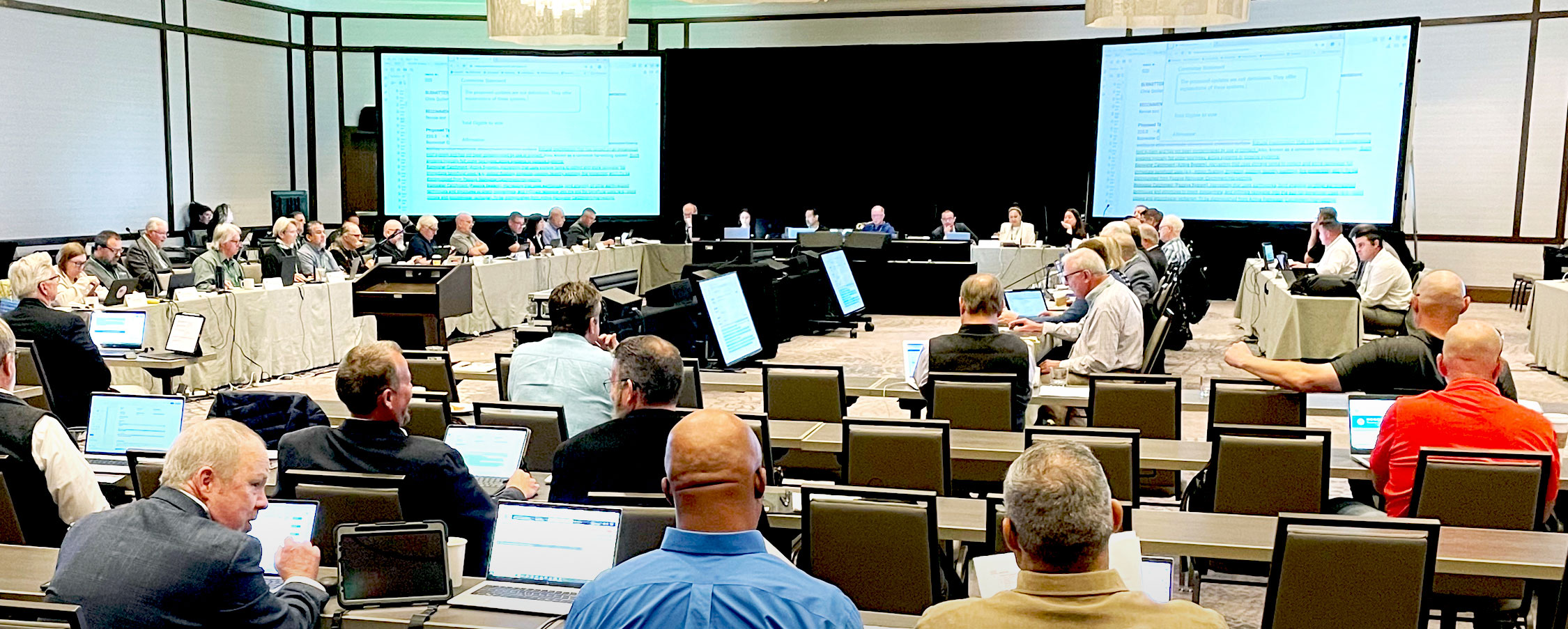
The International Association of Plumbing and Mechanical Officials (IAPMO®) recently completed Technical Committee Meetings toward the development of the 2027 editions of the Uniform Plumbing Code (UPC®) and Uniform Mechanical Code (UMC®), which will update the 2024 UPC and UMC, American National Standards governing the installation and maintenance of plumbing and mechanical systems nationwide. During their May 5-10 meetings in San Diego, the UPC committee acted on 371 proposals and generated one committee proposal. The UMC committee acted on 316 proposals and generated one committee proposal. The meeting monograph for these meetings can be obtained from the IAPMO Codes website.
Please visit the IAPMO Codes Portal (https://codeproposals.iapmo.org) to access documents related to the 2027 code development cycle and to submit public comments. The UMC and UPC Reports on Proposals will be open for comments from Sept. 6 to Jan. 17.
Uniform Plumbing Code
Adult Changing Stations. In 2023, the UPC Technical Committee formed the UPC Adult Changing Station Task Group to draft language for the UPC committee’s consideration. The task group developed three code changes (Items #059, #065, and #066). One of the proposals aims to regulate the location of adult changing stations in alignment with the building code and existing regulations. Additionally, this code change includes a requirement for a lavatory where an adult changing station is installed. The other two companion proposals address the installation of floor drains and hose bibbs where adult changing stations are installed to facilitate their proper sanitation and cleaning.
222.0 – T –
Toilet Facility. A room or space containing not less than one lavatory and one water closet.
Toilet Room. See Toilet Facility
422.6 Adult Changing Station. Where adult changing stations are provided, they shall be located in accordance with one of the following:
(1)The adult changing station shall be installed in a single-user toilet room.
(2)The adult changing station shall be installed in a family or assisted-use toilet room.
(3)The adult changing station shall be installed in a toilet room with multiple water closet compartments. The adult changing station shall be installed within a separate compartment with walls or partitions and a door. Where separate facilities are provided for each sex, the adult changing station shall be installed in both toilet rooms.
(4)The adult changing station shall be installed in a separate room with ventilation in accordance with the mechanical code.
422.6.1 Lavatory Location. Where an adult changing station is installed, a lavatory shall also be provided.
Another proposal was submitted (Item #067) relating to adult changing stations, which looks to add compliance to IAPMO Z1390 for assistive tables. This proposal was rejected due to the standard being in draft phase. The policies require that standards be completed and published for inclusion into the codes. The standard is expected to be completed in 2024.
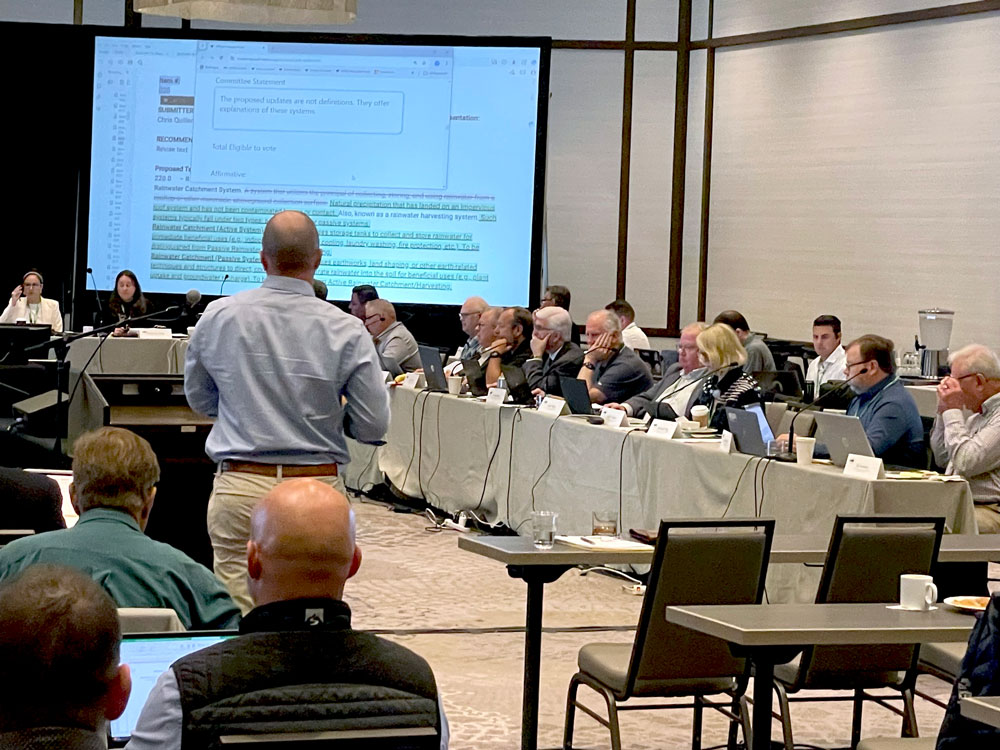
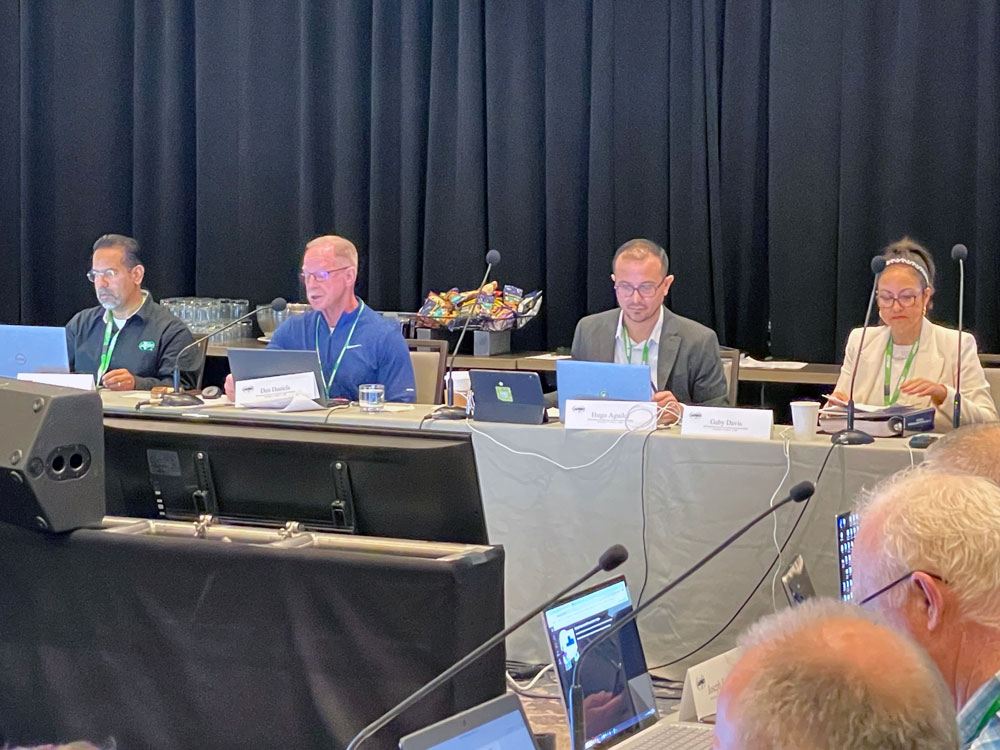
Left: The UPC Technical Committee hears testimony on a code change proposal.
Trenchless Installations. Trenchless installations drew quite the conversation. There were 11 separate proposals submitted for cured- in-place (CIPP) thermosetting resin pipe, four of which were accepted (Item #149, Item #156, Item #157, and Item #162). One of these proposals adds a new Section 708.2 for unique grade considerations pertaining to CIPP. Another proposal then adds new inspection and testing requirements for CIPP relining.
Due to the number of proposals received and the discussin on the floor, the UPC Technical Committee initiated a task group to review all proposals related to CIPP for the submission of comments to be discussed in May 2025. Please contact IAPMO staff for information on how to get involved on this task group.
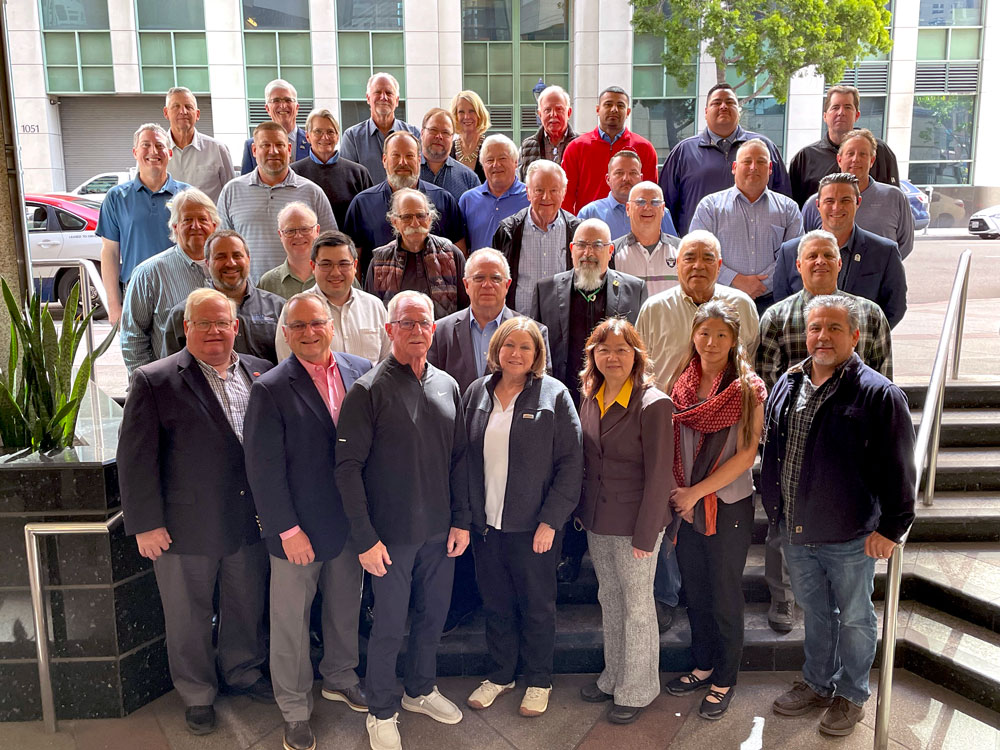
The 2027 UPC Technical Committee.
Legionella Growth Potential. During the 2024 code development cycle, the UMC Technical Committee formed a Legionella Task Group to address legionella growth in mechanical systems. The work from the task group is included in Item #295 of the UMC meeting monograph. To correlate Appendix N in the UPC with the language generated by the UMC Legionella Task Group, Item #319 was submitted to the UPC for consideration. Item #319 adds language for water management plans and modifies the temperature effects on survival and growth of Legionella for consistency with ASHRAE Guideline 12. Item #319 was accepted by the UPC Technical Committee.
Shutdown and Reopening of Plumbing Sytems. The content of the proposed appendix (Items #331 through #341) was developed by a joint working group formed by IAPMO and the AWWA to develop a Manual of Recommended Best Practice for: The Safe Closure and Reopening of Building Water Systems. As the world emerges from the COVID-19 pandemic, there will be countless studies that will consider where proactive efforts could have reduced the health and safety and the economic related impacts that resulted. Indeed, as a society we have learned a great deal and we will be better prepared for the next time we will need to respond to a similar threat on a global or regional scale, but only if we take the time to capture the best practices that are identified and put them into practice. These proposals were approved by the committee.
Below is a snapshot of the applicability section of the appendix.
Q 101.0 General.
Q 101.1 Applicability. This appendix shall apply to risk management practices for all potable and non-potable water supply systems during normal operation, when closing, during interruptions to normal operation, and when reopening building water systems in specific occupancy types. Part I shall apply to potable water systems and nonpotable water systems. Part II shall apply to potable water systems. Part III shall apply to nonpotable water systems.
Task Groups: The UPC Technical Committee requested two additional new task groups be formed to address provisions for CIPP and for water heaters. The Cured-in-Place Piping Task Group will review submitted proposals relating to cured-in-place piping. The Water Heater Task Group will review submitted proposals relating to first-hour rating and sizing parameters for different water heater types. Both the UPC and UMC Technical Committees requested that a Code Change Review Task Group be formed. The Code Change Review Task Group will review all proposals submitted and develop recommendations in the form of public comments.
Other topics discussed include: drinking fountains and sanitary yard hydrants; temperature limiting devices for fixtures; heat pump water heaters; fixture flow rates; hot water in healthcare facilities; hydrogen systems; disinfection of potable water systems; termination point of discharge piping serving temperature and pressure relief valves; drinking water treatment units; piping insulation; direct potable water reuse; and all-gender toilet facilities.
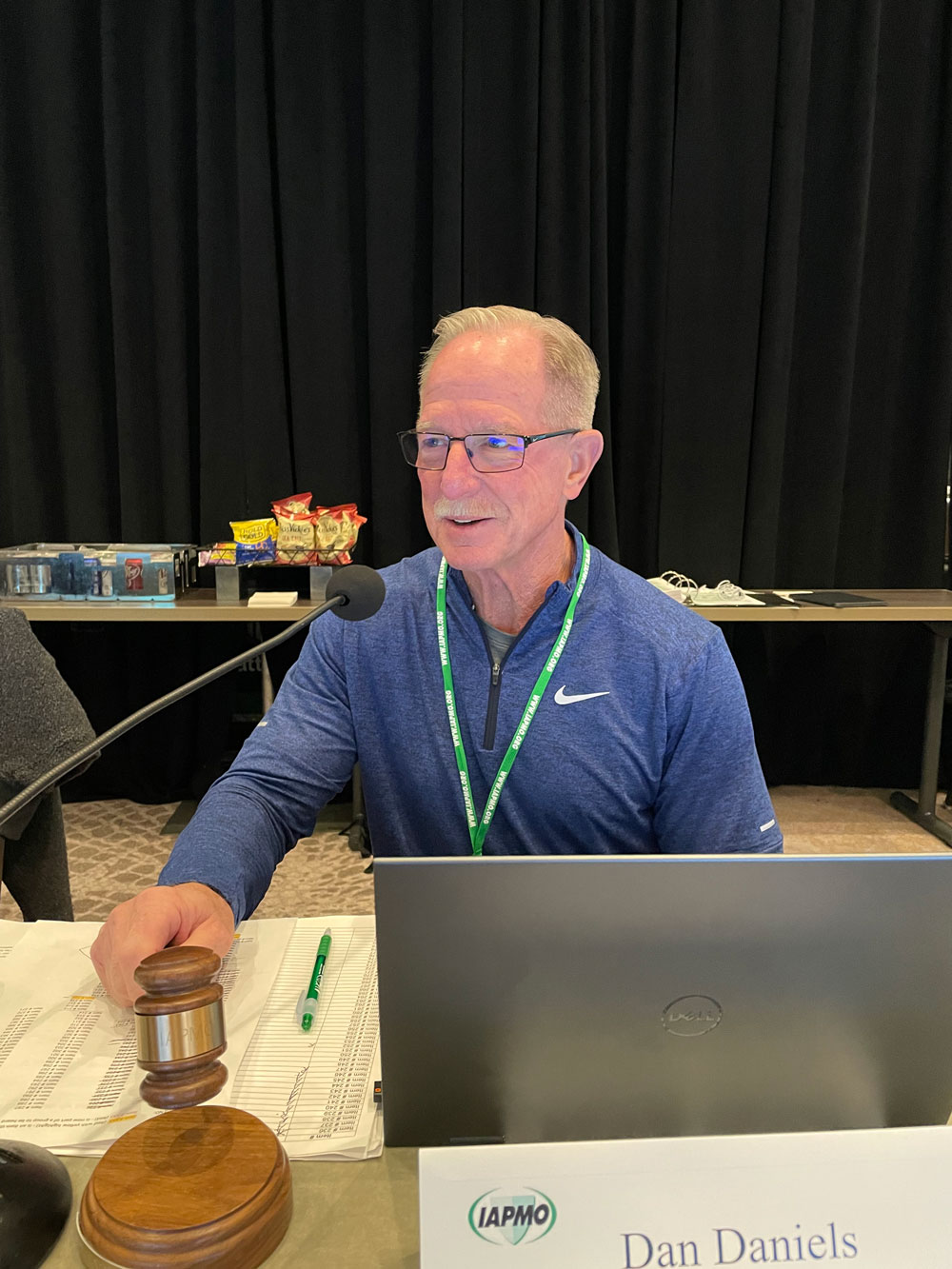
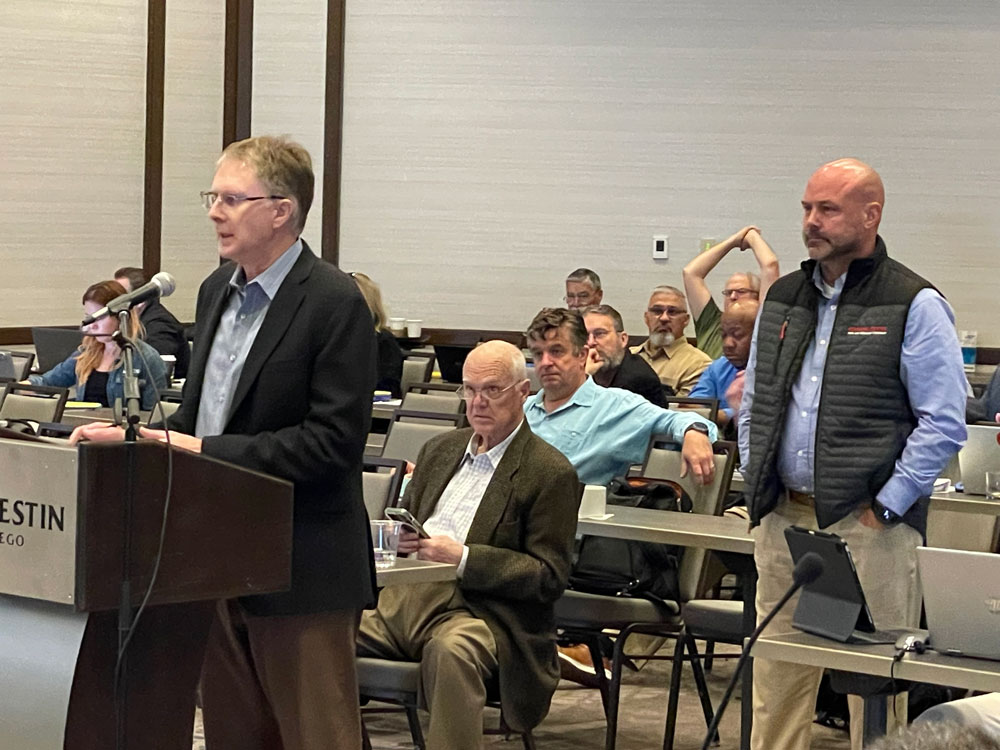
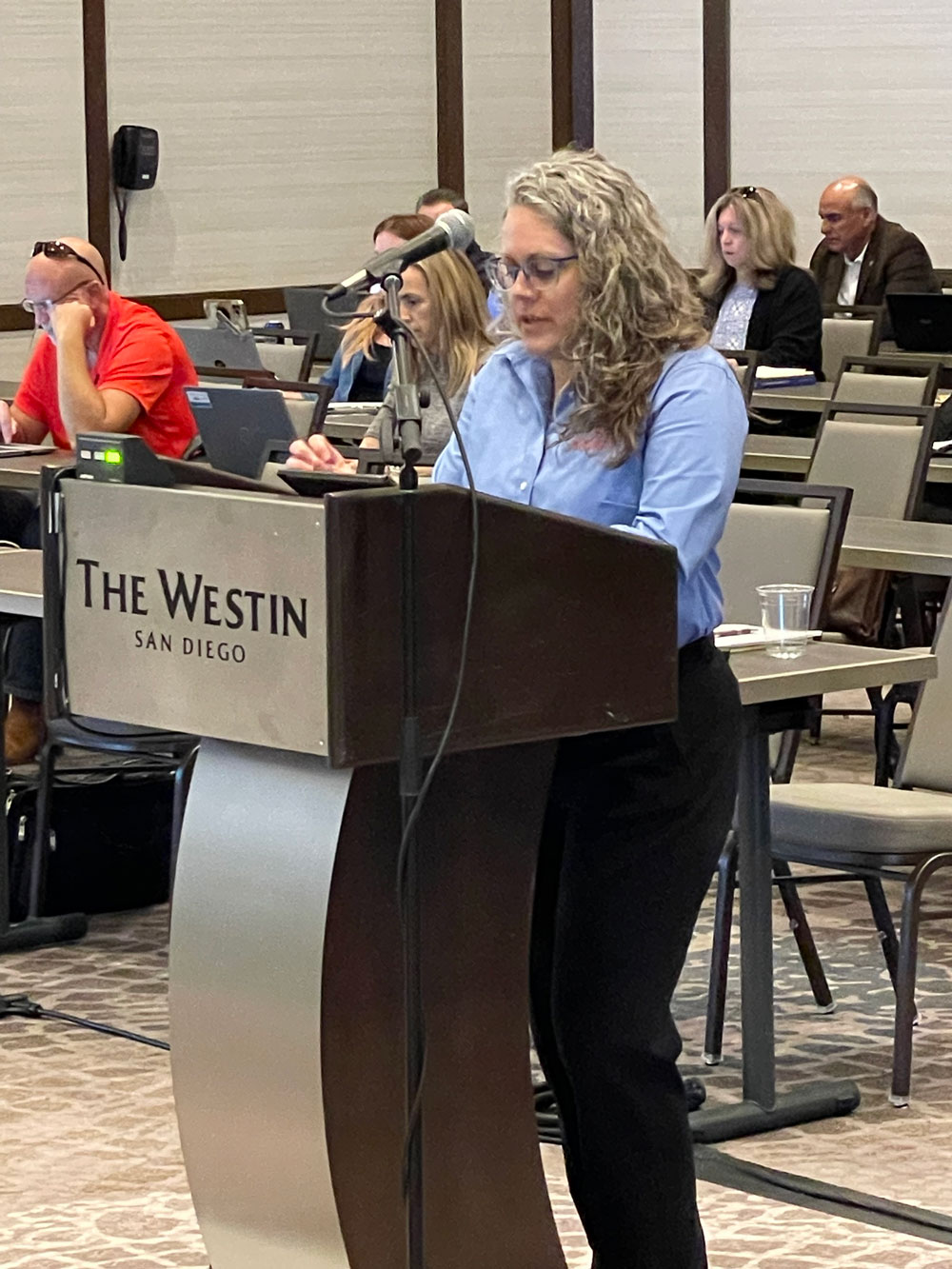
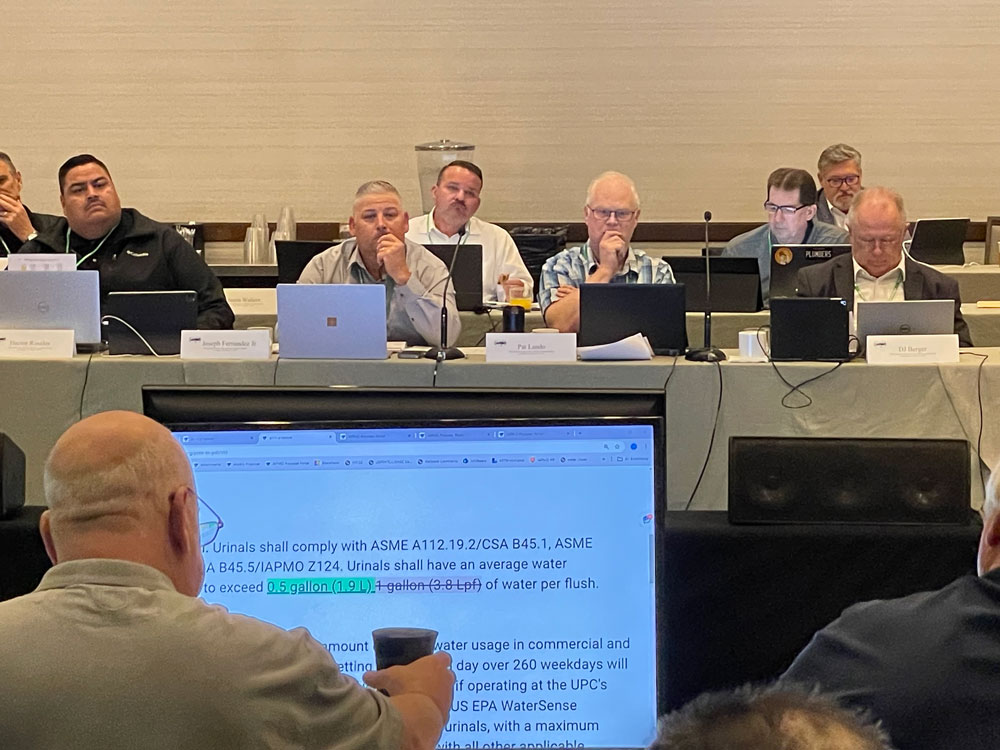
Uniform Mechanical Code
Low Global Warming Potential Refrigerants.
There were numerous proposals submitted by ASHRAE (such as Item #201) to update the UMC with the latest A2L provisions with ASHRAE 15. ASHRAE 15 was subdivided into ASHRAE 15 and ASHRAE 15.2. ASHRAE 15.2 encompasses all the requirements for residential refrigeration systems installed within a single dwelling unit. With the introduction of this new standard, the scope of ASHRAE 15 was revised to exclude residential refrigeration systems installed within a single dwelling unit. The introduction of ASHRAE 15.2 was included in Item #172.
Below is a snapshot of the section from Chapter 11 (Refrigeration).
1102.0 Refrigeration Systems.
1102.1 General. Refrigeration systems using a refrigerant other than ammonia shall comply with this chapter, and ASHRAE 15 or ASHRAE 15.2, as applicable. Refrigeration systems containing carbon dioxide as the refrigerant shall also comply with IIAR CO2.
Hydronic Systems. Many proposals were submitted and accepted to make hydronic systems safer for the public. One item to highlight is Item #207, which adds a new appendix for recommended configurations of both residential and non-residential closed-loop hydronic heating and cooling sytems. The recently approved appendix includes schematics gathered from IAPMO/ ANSI H1001.1 (Standard for Quality of Heat Transfer Fluids Used in Hydronics Systems) and includes piping schematics that will assist the hydronics industry.
Below is a snapshot of the sections introducing these piping schematics in the appendix.
K 102.0 Near Boiler Piping Schematics.
K 102.1 Systems with Chemical Additives. See Figure K 102.1(1) for a recommended near boiler piping schematic of a closed-loop hydronic system with chemical additives. The air separator is located at the optimal point within the system. See Figure K 102.1(2) for a recommended near boiler piping schematic of a closed-loop hydronic system utilizing glycol as the heat transfer fluid.
K 102.2 Systems without Chemical Additives. See Figure K 102.2 for a recommended configuration for a closed-loop hydronic system without chemical additives. The air separator is located at the optimal point within the system.
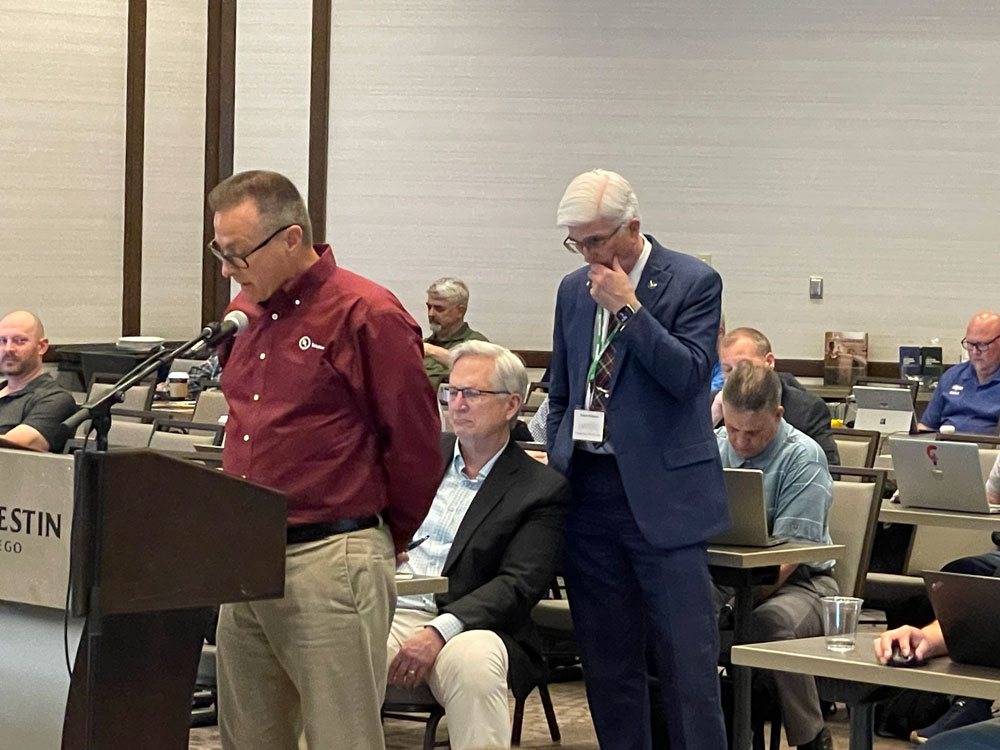
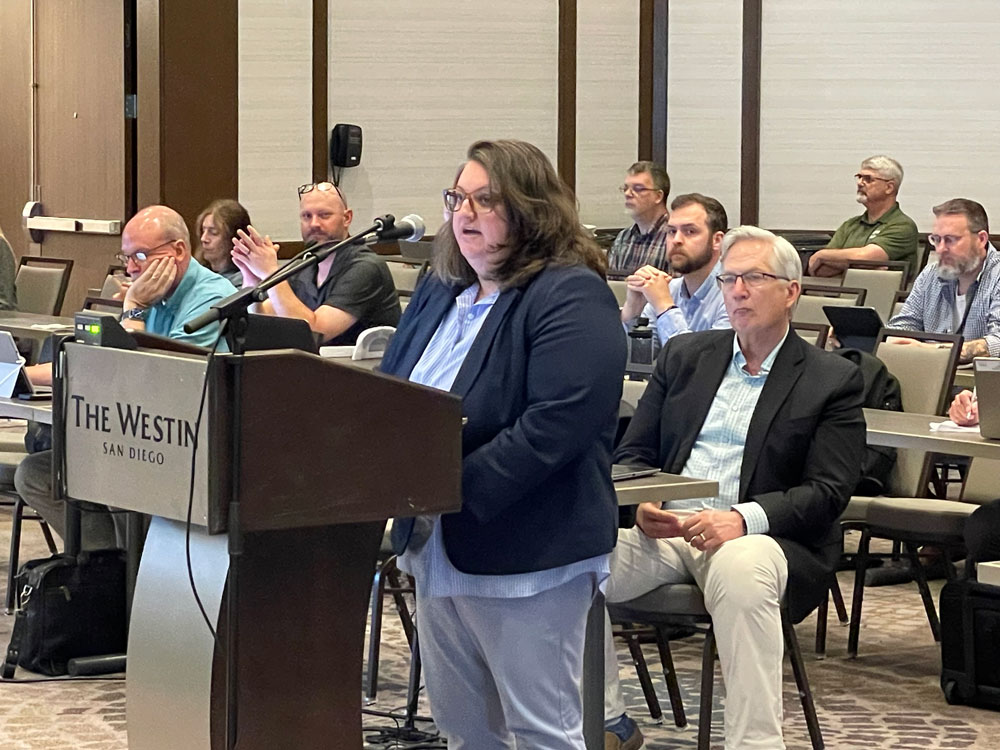
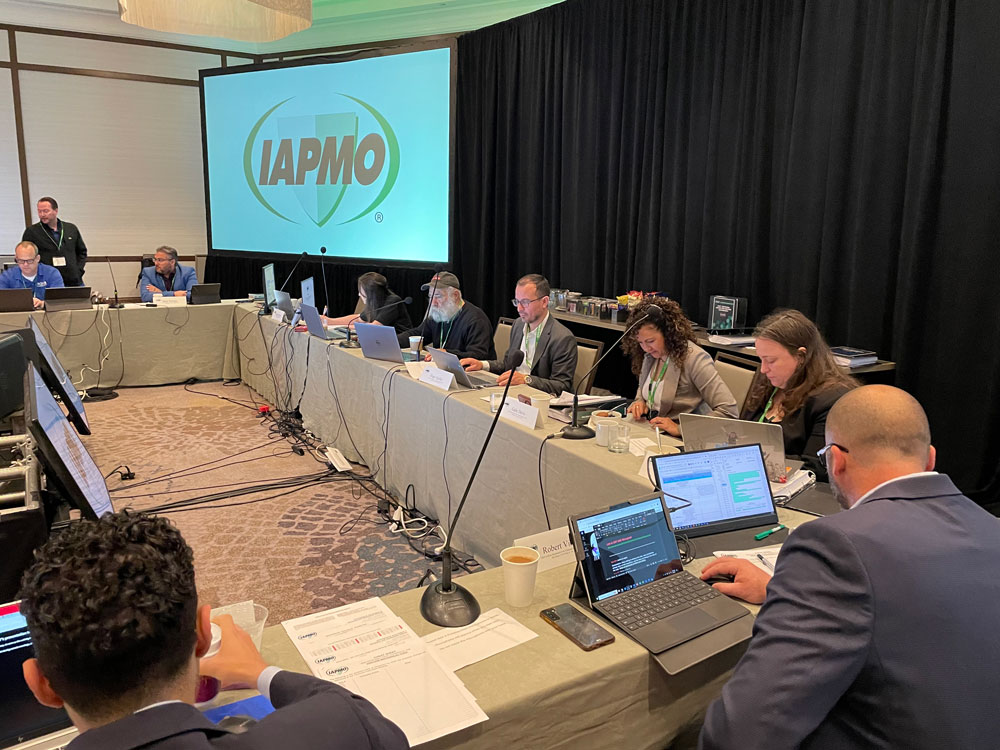
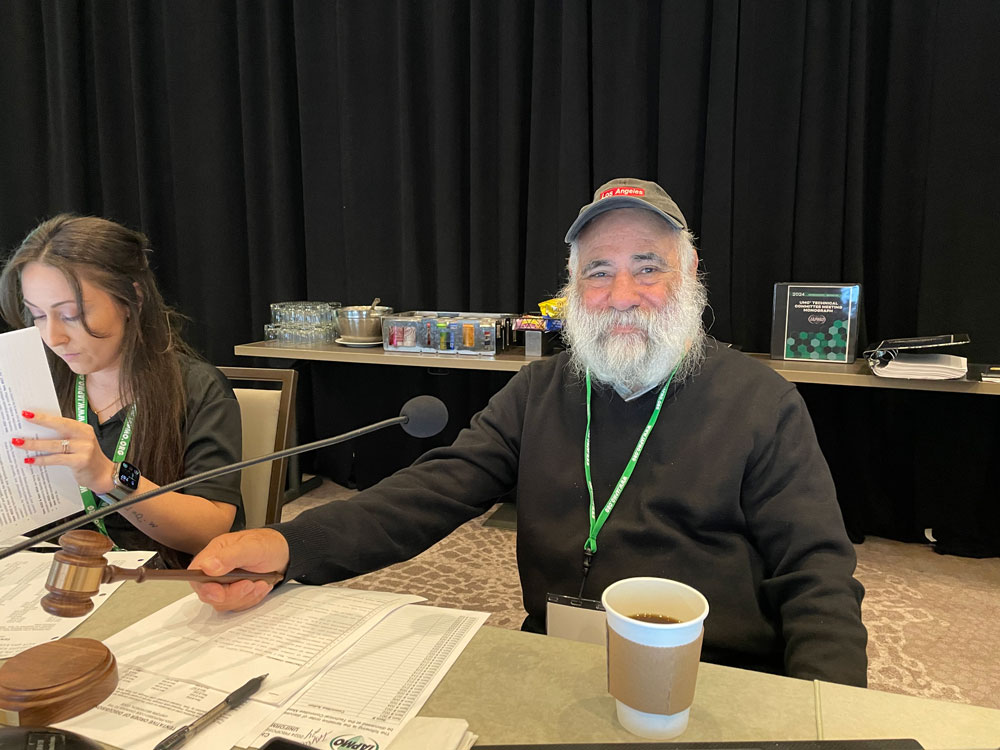
Legionella Growth Potential.
Legionella growth potential was a topic that was heavily discussed during the 2024 code development cycle. For this cycle, there were three proposals submitted to the UMC (Items #293, #294, and #295). Item #293, which was placed on hold during the 2024 code development cycle, was addressing the safe opening and shutdown of cooling towers based on the AWWA/IAPMO manual published in 2022; Item #294 was a proposal placed on hold during the 2024 code development cycle; and Item #295 was submitted by the Legionella Task Group for mechanical systems. Out of the three, Item #295 was approved, which adds a new appendix for Minimum Requirements to Address Legionella Growth in Mechanical Systems. The task group that generated Item #295 comprised experts in the industry, including members of ASHRAE 188 and ASHRAE Guideline 12 committees.
The following is a snapshot of the applicability section of the appendix.
H 101.0 General.
H 101.1 Applicability. This appendix provides minimum requirements to address Legionella growth in mechanical systems and shall apply to occupiable commercial, institutional, multi-unit residential, and industrial building mechanical systems. This appendix shall not include single-family residential buildings. Legionella control for plumbing systems shall be in accordance with the plumbing code. This appendix shall not be considered a risk management guidance document for Legionella.
Note: See ASHRAE 188 and ASHRAE Guideline 12 for additional factors associated with the potential for Legionella growth other than temperature.
Other topics discussed included: Exhaust ventilation for parking garages; ventilation and indoor air quality of dwelling units in residential occupancies; termination of exhaust ducts; commercial cooking appliances; duct leakage testing; materials used for ducts systems; materials exposed within ducts and plenums; air dispersion systems; vibration isolation connectors; duct insulation; air source heat pump water heaters; refrigerant detectors; multilayer composite piping, tubing, and fittings in refrigerating systems and gas piping systems; termination point of discharge piping serving temperature and pressure relief valves; and hydrogen systems.
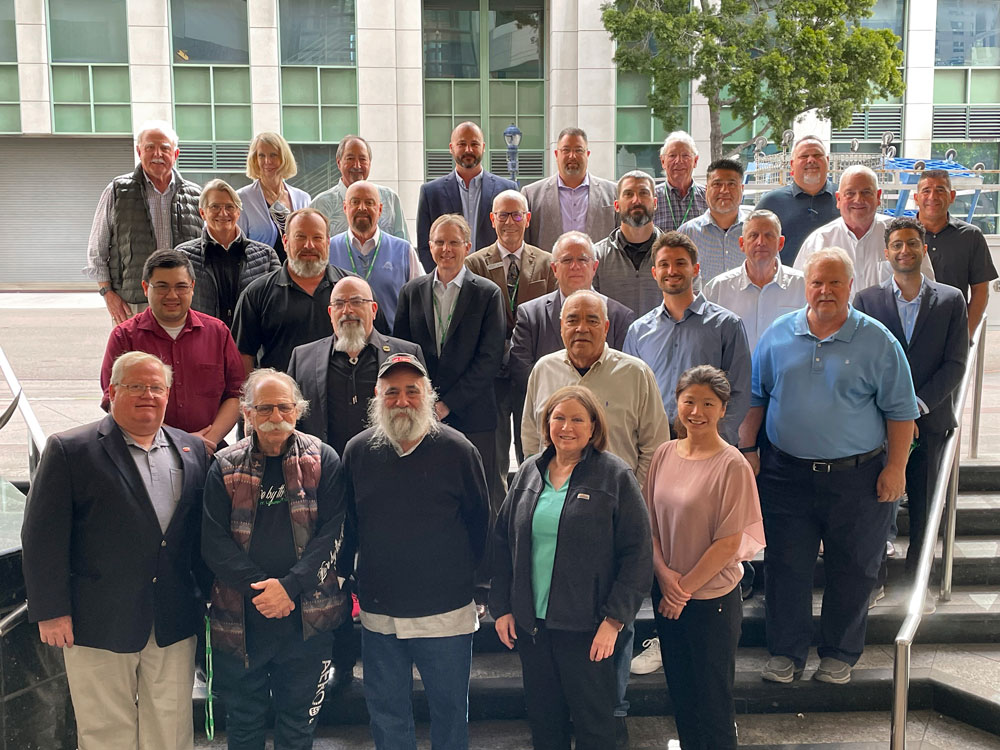
PHOTO COURTESY OF IAPMO
Next Steps
These are just some items discussed by the respective committees. The procedures require that all items be balloted to the committee after the meeting. For all items receiving at least a 2/3 affirmative vote via letter ballot, the committee action will carry forward. Any items that do not receive a 2/3 affirmative vote will be labeled as “fail ballots” and will be recommended for public comment. All suggested code amendments/additions/ deletions, including ballot results, will be published in the Report on Proposals (ROP) and will be available for public review on Aug. 9 with a deadline of Jan. 17. All comments received will be considered by the Technical Committees at their May 6-9, 2025, hearings.
Assembly Consideration Session
Eligible IAPMO members in attendance during the UPC and UMC Assembly Consideration Session will have the opportunity to vote on an Assembly Comment. This session will take place at IAPMO’s 95th annual Education and Business Conference, Sept. 24, in Las Vegas. Successful assembly comments will be forwarded to the respective Technical Committee for consideration.

Hugo Aguilar, P.E.
Last modified: August 31, 2024
